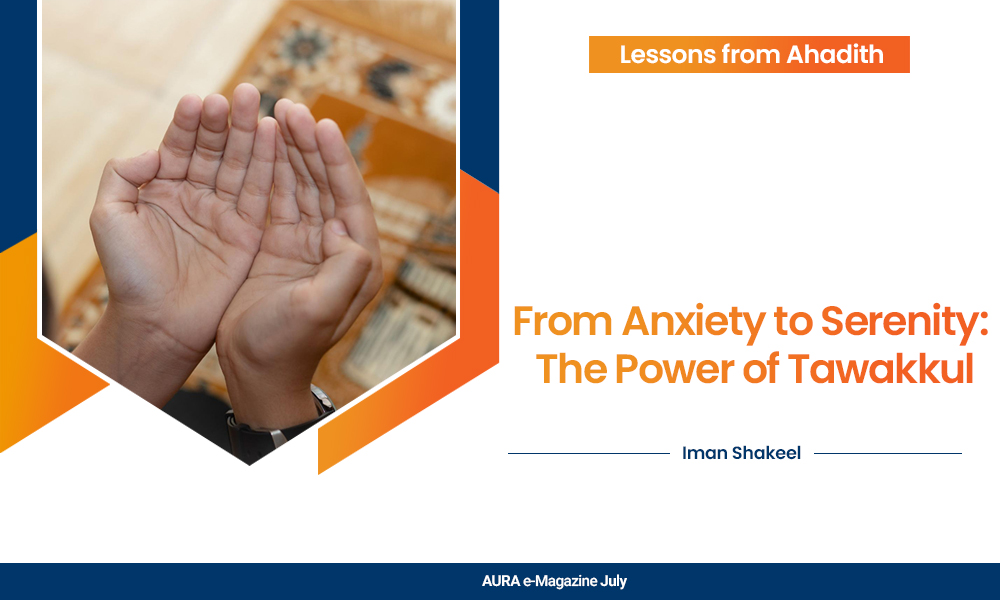Amid global turmoil and chaos, we frequently feel overwhelmed by the surrounding noise, leading to anxiety and hopelessness. We sometimes stress over minor issues and feel down, attempting to fix everything ourselves. When our efforts fail, our frustration grows. Being human, we often forget that we do not control the world. A greater power governs our destiny. As the Quran says, not even a leaf falls without God’s will (6:59).
In such desperate moments, we must remember that good things will come. Calamities will cease, and Allah will compensate for the devastations. This is His promise; He will never abandon us. Every challenge, whether big or small, is a test.
The beautiful verse from the Holy Quran (Surah Talaq, Verse 3) reaffirms our belief that there’s a way out of every situation. All one needs to do is remain calm, have taqwa, and wait patiently for Allah’s decree.
Allah says in the Holy Quran:
وَيَرْزُقْهُ مِنْ حَيْثُ لَا يَحْتَسِبُ ۚ وَمَن يَتَوَكَّلْ عَلَى اللَّـهِ فَهُوَ حَسْبُهُ ۚ إِنَّ اللَّـهَ بَالِغُ أَمْرِهِ ۚ قَدْ جَعَلَ اللَّـهُ لِكُلِّ شَيْءٍ قَدْرًا
And He provides for him from (sources) he never could imagine. And if any one puts his trust in Allah, sufficient is (Allah) for him. For Allah will surely accomplish his purpose: verily, for all things has Allah appointed a due proportion. (65:3)
In this verse, Allah promises those who put their trust in Him that He shall suffice for them against all odds because Allah will execute His decisions in whatever way He wills and chooses. Allah set a measure for all things. It is per this set measure that He decrees all acts. Tirmidhi and Ibn Majah recorded from Sayyidna Umar ؓ that Allah’s Messenger ﷺ said:
“If you trust in Allah as He ought to be trusted, He will provide for you in the same way He provides for the birds. They leave their nests while hungry in the mornings, but come back in the evenings with their bellies full.”
Imam Ahmad recorded that Ibn Abbas said that he rode the Prophet’s camel while sitting behind the Prophet, and the Messenger of Allah ﷺ said to him:
O boy! I will teach you words so learn them. Be mindful of Allah and He will protect you, be mindful of Allah and He will be on your side. If you ask, ask Allah, and if you seek help, seek it from Allah. Know that if the Ummah gather their strength to bring you benefit, they will never bring you benefit, except that which Allah has decreed for you. Know that if they gather their strength to harm you, they will never harm you, except with that which Allah has decreed against you. The pens have been raised and the pages are dry. (At-Tirmidhi)
Let’s understand Tawakkul (placing Reliance on Allah) in depth.
The concept of tawakkul, often translated as reliance or trust in Allah, is a profound and fundamental aspect of Islam. To truly grasp tawakkul, it’s essential to delve into its deeper meanings and practical applications. Allah, in the Quran, emphasises His love for those who have tawakkul:
“When you are firm (in making a decision), then have tawakkul in Allah, for surely Allah loves the people of tawakkul.” [Quran 3:159]
Moreover, Allah assures that He is sufficient for those who place their trust in Him:
“And whoever has tawakkul in Allah, He is sufficient for them.” [Quran 65:3]
Understanding tawakkul begins with comprehending Allah’s name, Al-Wakil, which means “The Guardian” or “The Disposer of Affairs.” In a legal context, “ wakil “ refers to someone you entrust with responsibility, akin to a power of attorney. This concept translates to a spiritual context where believers entrust their affairs to Allah, acknowledging He will make decisions in their best interests. Therefore, Allah as our Wakil means He is our Guardian and Protector, always looking out for us.
A practical illustration of tawakkul is found in a well-known hadith from Al-Tirmidhi:
“Tie your camel, then have tawakkul in Allah.”
This analogy, though involving a camel, can be better understood today with the example of locking a car. A person misunderstanding tawakkul might park their car, leave the windows down, make valuables visible, and not lock the doors, claiming Allah will protect their vehicle. This is not tawakkul but tamanni or false hopes in Allah.
True tawakkul involves taking all necessary precautions and then trusting Allah. In the car example, this means rolling up the windows, securing valuables, locking the car, and trusting Allah for its safety. This approach combines practical effort with spiritual reliance, acknowledging that while we do our part, the outcome is in Allah’s hands.
The Prophet Muhammad ﷺ exemplified this balance. He worked for sustenance, prepared his army for battles, wore armour, and sought medical treatment when ill. His actions demonstrate that taking worldly measures does not contradict tawakkul but complements it.
Tawakkul is an essential aspect of a Muslim’s faith, guiding them to exert effort while trusting Allah’s plan. This balance allows believers to navigate life’s challenges with resilience and peace of mind, knowing they have done their part and left the rest to Allah’s wisdom and decree.
May Allah grant us true tawakkul, allowing us to rely on Him as we go about our lives. May He bestow upon us goodness in this world and the Hereafter.
Ameen!


الله أعطيك الصحه والعافيه يا رب العالمين حبيبتي..
ما شا ء الله
تبارك الرحمان
اللهم زد فزد
Your explanation of Tawkkul was in a clear and enlightening manner. May Allah bless you. I am eagerly anticipating more informative articles.